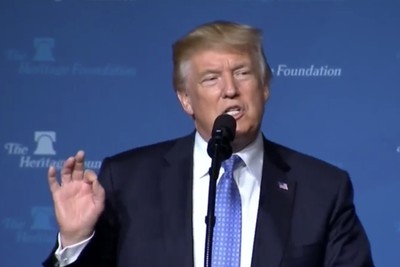Project 2025, a comprehensive policy proposal, aims to reshape the U.S. federal government, and this guide by CONDUCT.EDU.VN provides a detailed examination of its objectives and potential impacts. By understanding the core tenets of this initiative, individuals can better navigate the evolving landscape of American governance and its implications for society. This guide explores key proposals, policy shifts, and conservative leadership strategies.
1. Understanding Project 2025: An Overview
Project 2025 is a detailed plan spearheaded by the Heritage Foundation, a conservative think tank, designed to streamline the federal government and implement significant policy changes under a future conservative president. It addresses diverse areas, including tax reform, immigration, social welfare, and energy policies, aiming to reshape the administrative state. This initiative includes a detailed policy book titled “Mandate for Leadership: The Conservative Promise.”
1.1. The Core Objectives of Project 2025
Project 2025 seeks to fundamentally alter the structure and function of the federal government. Its primary goals include:
- Reducing the Size and Scope of Government: By cutting federal spending and privatizing government functions, the project aims to decrease the government’s role in various sectors.
- Implementing Conservative Policies: The plan advocates for conservative stances on issues such as abortion, education, and energy.
- Restructuring Federal Agencies: It proposes overhauling several departments, including Justice, Homeland Security, and Housing and Urban Development, to align with conservative principles.
- Promoting Traditional Values: Project 2025 seeks to reinforce what it considers traditional American values across various aspects of public life.
1.2. Key Participants and Funding
The Heritage Foundation leads and funds Project 2025, with support from over 100 conservative organizations. Key figures and groups involved include:
- The Heritage Foundation: A conservative public policy think tank founded in 1973.
- Advisory Board: Includes organizations like the Center for Immigration Studies, Moms for Liberty, and the America First Legal Foundation.
- Notable Authors: Contributors include former Trump administration officials such as Dr. Ben Carson, Christopher Miller, and Russ Vought.
- Funding: Primarily sourced from conservative donors and organizations aligned with the project’s goals.
1.3. The Four Pillars of Project 2025
The project is built on four key components, designed to ensure a smooth transition and rapid implementation of its policies:
- Policy Agenda: Detailed in the “Mandate for Leadership” book, outlining specific policy recommendations.
- Personnel Database: A database to recommend and vet candidates for key positions in a new administration.
- Presidential Administration Academy: A training program for new hires to ensure they understand government functions and conservative principles.
- The Playbook: Transition plans to enable the next president to quickly implement Project 2025’s agenda.
2. Major Policy Proposals Within Project 2025
Project 2025 encompasses a wide range of policy proposals across various sectors. Understanding these proposals is crucial for grasping the potential impact of the project.
2.1. Social and Cultural Policies
The project advocates for significant changes in social and cultural policies, reflecting conservative values.
- Abortion: Calls for protecting the unborn in every jurisdiction, ending federal funding for abortion providers, and enforcing existing laws to prevent the mailing of abortion pills.
- Education: Advocates for abolishing critical race theory and gender ideology in public schools, removing terms like “diversity, equity, and inclusion” from federal documents, and eliminating the Department of Education.
- Healthcare: Seeks to protect the health and well-being of Americans from conception and end mandatory health insurance coverage of certain emergency contraceptives.
2.2. Economic and Tax Policies
Project 2025 aims to reshape the U.S. economy through significant tax and fiscal reforms.
- Tax Reform: Proposes a two-rate individual tax system of 15% and 30%, eliminating most deductions, credits, and exclusions. It also seeks to reduce the corporate tax rate from 21% to 18%.
- Federal Spending: Calls for cutting federal spending and privatizing government functions, including the National Weather Service and the Transportation Security Administration.
- Energy Policy: Advocates for dismantling agencies and offices that promote clean energy and monitor climate change, shifting focus to traditional energy sources.
2.3. Immigration and Border Security
The project outlines strict measures to control immigration and secure the border.
- Asylum and Refugee Policies: Seeks to tighten asylum requirements and reduce the number of refugees admitted into the country.
- Border Security: Recommends reinstating Trump’s Migrant Protection Protocols (Remain in Mexico) and overturning the Flores Settlement Agreement.
- Visa Programs: Proposes eliminating or significantly reducing visas issued to foreign students from enemy nations, cutting guest worker visas, and repealing the diversity visa program.
2.4. Welfare and Social Safety Net Programs
Project 2025 aims to reform social welfare programs by tightening eligibility requirements and reducing benefits.
- Medicaid: Proposes adding work requirements for beneficiaries and imposing time limits or lifetime caps to discourage long-term dependence.
- SNAP and TANF: Calls for tightening work requirements for the Supplemental Nutrition Assistance Program (SNAP) and changing eligibility requirements for Temporary Assistance for Needy Families (TANF).
- Child Care and Education: Seeks to incentivize at-home child care and eliminate Head Start, a program that funds education and social services for low-income children.
3. Potential Impacts of Project 2025
The implementation of Project 2025 could have far-reaching effects on various aspects of American life.
3.1. Economic Impacts
The proposed tax and spending reforms could lead to significant economic shifts.
- Tax Cuts: The reduction in tax rates for corporations and high-income individuals could stimulate economic growth but may also increase income inequality.
- Privatization: Privatizing government functions could lead to increased efficiency in some areas but may also result in reduced services in others.
- Reduced Regulation: Deregulation of industries, particularly in the energy sector, could boost economic activity but may also have negative environmental consequences.
3.2. Social and Cultural Impacts
The project’s social and cultural policies could reshape American society in profound ways.
- Abortion Access: Restrictions on abortion access could lead to significant health and social implications for women, particularly those in low-income communities.
- Education System: Changes to the education system, such as the elimination of diversity programs, could impact the educational outcomes and opportunities for marginalized groups.
- Social Welfare: Reforms to social welfare programs could affect the living standards and opportunities for low-income families and individuals.
3.3. Environmental Impacts
The project’s energy and environmental policies could have significant consequences for the environment.
- Climate Change: Reducing efforts to combat climate change and shifting focus to traditional energy sources could exacerbate environmental problems.
- Environmental Protection: Deregulation and reduced funding for environmental agencies could lead to increased pollution and habitat destruction.
- Renewable Energy: Decreased support for renewable energy technologies could slow the transition to a sustainable energy future.
3.4. Legal and Constitutional Challenges
Many of the proposals within Project 2025 could face legal and constitutional challenges.
- Abortion Restrictions: Legal challenges related to the constitutionality of abortion restrictions are likely to continue.
- Immigration Policies: Policies such as the reinstatement of the Remain in Mexico program could face legal challenges based on international law and human rights concerns.
- Executive Power: Attempts to expand executive power and reduce the authority of federal agencies could be challenged in the courts.
4. Expert Analysis and Critique of Project 2025
Understanding the expert perspectives and critiques of Project 2025 provides a balanced view of its potential impacts.
4.1. Conservative Perspectives
Conservative supporters of Project 2025 argue that it is necessary to restore traditional values, reduce government overreach, and promote economic growth.
- Economic Efficiency: They believe that cutting taxes and reducing regulations will stimulate economic activity and create jobs.
- Fiscal Responsibility: Conservatives argue that reducing federal spending and privatizing government functions will lead to greater fiscal responsibility and efficiency.
- Traditional Values: They support the project’s efforts to reinforce traditional American values and protect religious freedom.
4.2. Liberal and Progressive Perspectives
Liberal and progressive critics of Project 2025 argue that it would harm vulnerable populations, exacerbate inequality, and undermine democratic institutions.
- Social Justice: They argue that the project’s policies would disproportionately harm marginalized groups and exacerbate social inequality.
- Environmental Concerns: Critics express concerns about the potential environmental impacts of the project’s energy and environmental policies.
- Democratic Values: They argue that the project’s efforts to expand executive power and undermine federal agencies would weaken democratic institutions.
4.3. Independent and Non-Partisan Analysis
Independent analysts offer a balanced assessment of Project 2025, highlighting both its potential benefits and drawbacks.
- Economic Impacts: Some analysts suggest that the project’s tax cuts could stimulate short-term economic growth but may also lead to long-term fiscal challenges.
- Social Consequences: They note that the project’s social and cultural policies could have both positive and negative impacts, depending on one’s values and priorities.
- Implementation Challenges: Independent analysts highlight the potential challenges of implementing the project’s ambitious agenda, including legal obstacles and political opposition.
5. The Political Landscape and Project 2025
The future of Project 2025 depends largely on the political landscape and the outcome of future elections.
5.1. Presidential Elections
The success of Project 2025 is closely tied to the outcome of presidential elections. A conservative president who supports the project would be more likely to implement its policies.
- Trump’s Stance: While Trump initially appeared to support the project, he has since distanced himself from it, claiming to know nothing about it and disagreeing with some of its proposals.
- Democratic Opposition: Democratic candidates have strongly criticized Project 2025, arguing that it would harm the country and undermine democratic values.
5.2. Congressional Support
Even with a supportive president, Project 2025 would require congressional support to enact its policies.
- Legislative Challenges: Many of the project’s proposals could face significant legislative challenges, particularly in a divided Congress.
- Bipartisan Opposition: Some of the project’s proposals may face bipartisan opposition, making it difficult to pass them into law.
5.3. Public Opinion
Public opinion could also play a significant role in shaping the future of Project 2025.
- Public Support: If the public supports the project’s goals, it could create political pressure on lawmakers to enact its policies.
- Public Opposition: Conversely, if the public opposes the project, it could make it more difficult for lawmakers to support it.
6. Key Criticisms and Controversies Surrounding Project 2025
Project 2025 has faced significant criticism and controversy from various quarters.
6.1. Concerns About Authoritarianism
Critics argue that Project 2025’s emphasis on expanding executive power and centralizing control could lead to authoritarianism.
- Executive Overreach: Concerns have been raised about the potential for a conservative president to abuse executive power to implement the project’s policies without congressional approval.
- Undermining Checks and Balances: Critics argue that the project’s proposals could undermine the system of checks and balances that is essential for preserving democracy.
6.2. Allegations of Misinformation and Fearmongering
Some critics accuse Democrats of misrepresenting Project 2025 and using it to scare voters.
- Exaggerated Claims: Allegations have been made that Democrats have exaggerated the potential impacts of the project and falsely tied it to specific policies that Trump has opposed.
- Political Manipulation: Critics argue that Democrats are using Project 2025 as a political tool to mobilize voters and attack Republicans.
6.3. Impact on Government Services and Civil Rights
Civil rights groups and government employee unions have voiced concerns about the potential impacts of Project 2025 on government services and civil rights.
- Reduced Services: Concerns have been raised that the project’s proposed budget cuts and privatization efforts could lead to reduced government services and harm vulnerable populations.
- Erosion of Civil Rights: Civil rights groups argue that the project’s policies could undermine civil rights protections and discriminate against marginalized groups.
7. The Role of CONDUCT.EDU.VN in Understanding Ethical Guidelines
In navigating complex policy proposals like Project 2025, understanding ethical guidelines is paramount. CONDUCT.EDU.VN offers valuable resources and insights into ethical standards and responsible conduct.
7.1. Accessing Ethical Guidelines and Resources
CONDUCT.EDU.VN provides access to comprehensive information on ethical guidelines across various sectors.
- Detailed Information: The website offers detailed explanations of ethical principles and standards relevant to different professions and industries.
- Practical Guidance: It provides practical guidance on how to apply ethical principles in real-world situations.
7.2. Understanding Ethical Dilemmas
CONDUCT.EDU.VN helps individuals understand and navigate ethical dilemmas that may arise in the context of policy proposals like Project 2025.
- Case Studies: The website features case studies that illustrate ethical dilemmas and provide insights into how to resolve them.
- Expert Analysis: It offers expert analysis and commentary on ethical issues related to policy and governance.
7.3. Promoting Ethical Conduct
CONDUCT.EDU.VN promotes ethical conduct by providing resources and training on ethical decision-making.
- Training Programs: The website offers training programs and workshops on ethical leadership and responsible conduct.
- Community Engagement: It encourages community engagement and dialogue on ethical issues.
8. Staying Informed and Engaged with Project 2025
Staying informed and engaged with Project 2025 is crucial for understanding its potential impacts and shaping its future.
8.1. Monitoring Policy Developments
Keep track of policy developments related to Project 2025 by following reliable news sources and policy analysis organizations.
- Reputable News Outlets: Follow reputable news outlets that provide in-depth coverage of policy and politics.
- Policy Analysis Organizations: Monitor policy analysis organizations that provide non-partisan analysis of policy proposals.
8.2. Engaging in Civic Discourse
Participate in civic discourse by engaging in respectful dialogue with people who have different views on Project 2025.
- Community Forums: Attend community forums and town hall meetings to discuss the project and its potential impacts.
- Online Discussions: Participate in online discussions and share your views on social media.
8.3. Contacting Elected Officials
Make your voice heard by contacting your elected officials and expressing your views on Project 2025.
- Writing Letters: Write letters to your elected officials and share your concerns or support for the project.
- Making Phone Calls: Call your elected officials and speak to a staff member about your views.
9. Addressing Common Misconceptions About Project 2025
It is essential to address common misconceptions about Project 2025 to ensure a clear and accurate understanding.
9.1. Debunking False Claims
Be aware of false or misleading claims about Project 2025 and rely on credible sources for information.
- Fact-Checking: Verify claims about the project by consulting fact-checking websites and reputable news organizations.
- Critical Thinking: Apply critical thinking skills to evaluate information and identify potential biases.
9.2. Clarifying Policy Proposals
Clarify the specific policy proposals within Project 2025 and avoid generalizations or exaggerations.
- Detailed Analysis: Review the details of the project’s policy proposals to understand their potential impacts.
- Nuanced Discussion: Engage in nuanced discussions about the project and avoid oversimplifying complex issues.
9.3. Emphasizing Ethical Considerations
Emphasize the ethical considerations related to Project 2025 and promote responsible and ethical conduct.
- Ethical Dialogue: Engage in ethical dialogue about the project and its potential impacts on society.
- Ethical Leadership: Promote ethical leadership and responsible decision-making.
10. Conclusion: The Future of Governance and Project 2025
Project 2025 represents a significant proposal for reshaping the U.S. federal government. Its future depends on various factors, including presidential elections, congressional support, and public opinion. Staying informed, engaging in civic discourse, and addressing common misconceptions are essential for understanding and shaping the future of governance.
10.1. The Importance of Ethical Decision-Making
In navigating complex policy proposals like Project 2025, ethical decision-making is paramount. CONDUCT.EDU.VN provides valuable resources and insights into ethical standards and responsible conduct.
10.2. Call to Action
Visit CONDUCT.EDU.VN at CONDUCT.EDU.VN to access comprehensive information on ethical guidelines, practical guidance on ethical dilemmas, and training programs on ethical decision-making. Engage with us to promote ethical conduct and responsible governance. For further information, contact us at 100 Ethics Plaza, Guideline City, CA 90210, United States, or via Whatsapp at +1 (707) 555-1234.
10.3. Final Thoughts
The future of governance depends on informed citizens and ethical leaders who are committed to upholding democratic values and promoting the common good. By staying informed, engaging in civic discourse, and emphasizing ethical considerations, we can all play a role in shaping a better future for our country.
FAQ: Understanding Project 2025
Q1: What is Project 2025?
Project 2025 is a comprehensive policy proposal led by the Heritage Foundation aimed at reshaping the U.S. federal government under a future conservative president. It addresses areas such as tax reform, immigration, social welfare, and energy policies.
Q2: Who is behind Project 2025?
The project is led and funded by the Heritage Foundation, with support from over 100 conservative organizations. Key figures include former Trump administration officials.
Q3: What are the main goals of Project 2025?
The primary goals include reducing the size and scope of government, implementing conservative policies, restructuring federal agencies, and promoting traditional values.
Q4: How does Project 2025 propose to change tax policy?
The project proposes a two-rate individual tax system of 15% and 30%, eliminating most deductions, credits, and exclusions. It also seeks to reduce the corporate tax rate from 21% to 18%.
Q5: What are the potential impacts of Project 2025 on social welfare programs?
Project 2025 aims to reform social welfare programs by tightening eligibility requirements and reducing benefits for programs like Medicaid, SNAP, and TANF.
Q6: What are the environmental policy proposals in Project 2025?
The project advocates for dismantling agencies and offices that promote clean energy and monitor climate change, shifting focus to traditional energy sources.
Q7: How does Project 2025 address immigration and border security?
The project outlines strict measures to control immigration, tighten asylum requirements, reinstate the Remain in Mexico program, and reduce visas issued to foreign students.
Q8: What are the criticisms of Project 2025?
Critics argue that Project 2025 could lead to authoritarianism, harm vulnerable populations, exacerbate inequality, and undermine democratic institutions.
Q9: How can I stay informed about Project 2025?
You can stay informed by following reputable news sources, policy analysis organizations, engaging in civic discourse, and contacting elected officials.
Q10: Where can I find more information about ethical guidelines related to policy proposals like Project 2025?
Visit conduct.edu.vn for comprehensive information on ethical guidelines, practical guidance on ethical dilemmas, and training programs on ethical decision-making.


